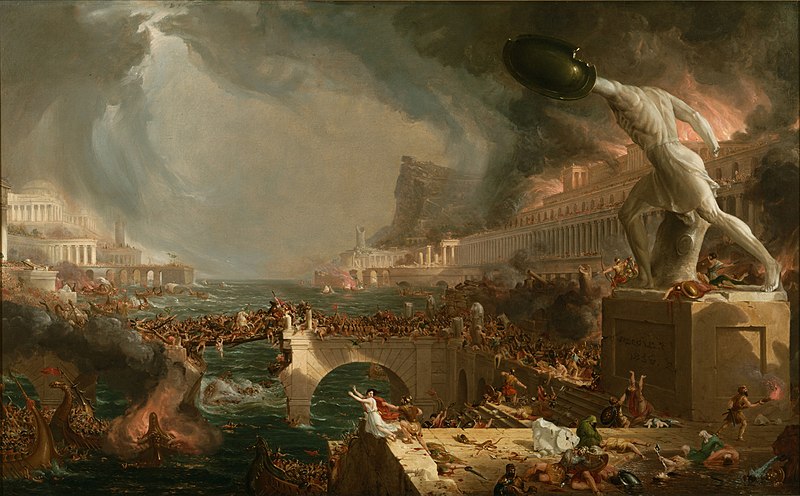The two broad political ways that reactionaries talk about changing one's circumstances are voice (influencing the political environment where you are) and exit (leaving for a different political environment).
As far as I can tell, one of the main distinctions between conservatives and reactionaries is that the latter believe that voice is mostly a dead end under current political arrangements. There is little to hope for from the democratic process, except perhaps as a longshot mechanism for abolishing the democratic process itself. As a result, politics quickly becomes uninteresting, except as a sideshow and a freakshow. When one abandons the conceit that one's voice matters, why in the name of all that is holy would you voluntarily watch three hours of Republican candidates' debates? Have you read all the great books already? Is there really nothing else better on Netflix?
Okay, so what of exit?
Well, this can take several forms, none of them particularly likely.
At the mild end is moving to another, more acceptable, state. Though this presupposes you can find one to your taste (maybe Texas) that will stay that way (whoops, cancel Texas - with current immigration patterns, anyone want to wager on it still being a red state in 20 years?). The slightly more interesting version of this is the Free State Project - get enough like-minded people to move to one small state (in this case, New Hampshire) and vote to change it. You're still under the Federal Government, but it's a start.
But what else? Move to a more reactionary-minded country? That seems an even harder mission than moving to a liberty-minded US state. Singapore, perhaps? Maybe. But if there's one thing that the Arab Spring taught us, it's that the State Department takes a very fickle attitude to allies that don't quite toe the liberal democratic line. At the moment, they tolerate Singapore. I would be less confident that this will continue to be the case for the next 50 years.
The more interesting options involve a combination of voice and exit - find some existing piece of land to make into a new country, and run it as you like.
At a first glance, this seems hard, but more promising than the alternatives. There are a range of ways to find a piece of land to govern and turn into a sovereign entity. They vary considerably in practicality. At one end, one can create new land with a bunch of rafts in the middle of the ocean, like the
seasteading guys. I think this shows how eager people are to build a new sovereign land - they're willing to fudge the whole 'land' bit to make it happen. The relatively small number of people who choose to live on boats in the ordinary course of events shows you that this ain't exactly plan A, except under very dire circumstances.
More likely you're down to two options. You can take an existing functional part of America and try to secede. Or you could take over an existing crappy country by a coup.
The $64,000 question, of course, is whether Washington would let either of these things happen.
Since both are a long way from happening, it's hard to get a definite answer. You need to dig around to see the reaction to fringe possibilities and try to extrapolate.
One that caught my eye was the following
from February this year:
Feds raid Texas secessionist meeting
...Minutes into the meeting a man among the onlookers stood and moved to open the hall door, letting in an armed and armored force of the Bryan Police Department, the Brazos County Sheriff's Office, the Kerr County Sheriff's Office, Agents of the Texas District Attorney, the Texas Rangers and the FBI.
...In the end, at least 20 officers corralled, searched and fingerprinted all 60 meeting attendees, before seizing all cellphones and recording equipment in a Valentine's Day 2015 raid on the Texas separatist group.
...He acknowledged he used a "show of force," grouping officers from city, county state and federal law enforcement to serve a search warrant for suspicions of a misdemeanor crime. He said he had worries that some extremists in the group could become violent, citing a 1997 incident when 300 state troopers surrounded an armed Republic leader for a weeklong standoff.
This is very revealing. There is absolutely no logistical need to involve 5 separate law enforcement agencies to process a non-violent meeting of 60 people on the suspicion that they committed a misdemeanor offense. But they wanted to display the full power of the government, at all levels, to those who were under the impression that Their Voice Matters
™ - you will have no support from existing power structures, even in Texas. They absolutely did
not want to just send in the FBI to stoke possible paranoia about the Feds.
Of course, the separatists' actions seemed tailor-made to produce exactly this outcome:
The raid was a response to legal summons sent by Republic of Texas members to a Kerr County judge and bank employee, demanding they appear in the Republic's court at the Veterans and Foreign Wars building in Bryan the day the officers stormed in.
Jesus Christ, talk about stupid. With allies like these...
The current secessionist group made themselves obvious targets by threatening government officials. This is a fast way to not only tar yourselves as possibly criminal, but also to eliminate any sympathy among local law enforcement, some of whom might otherwise support the 'Texas Pride' angle of secession. You threaten judges, and don't expect blowback from every single cop in the country?
The motto should be 'we just want a vote on the issue'.
That is much harder to argue against.
If Washington has one possible Achilles Heel, it is the following: they are not fully immune from their own propaganda about the nobility of the democratic process. Hence, if you actually get a vote to pass, resisting it becomes considerably harder.
Suppose, in other words, that the separatists actually manage to get Texas to hold a referendum on seceding, and it passes. With what language will Washington condemn the decision? How will they justify their desire to squelch the voice of the people? Do they not believe in Democracy, source of all that is good and right in the world?
The EU, while not strong enough to force countries to stay in against their will, is at least willing to display open contempt for the democratic process. The US, so far, is only willing to do so using the Supreme Court.
In 1860, the answer was straightforward - "F*** you, you don't get to leave".
Do you think they still have the stones to say that, and back it up? I truly don't know.
I think they would worry where the next move in the chess game went - should the State of Texas attempt to engage in forced secession, would the Feds be willing to send in the army to shoot the place up with the TV cameras rolling, firing on US citizens?
For obvious reasons, they prefer to fight this preemptively as a law enforcement action, not as a military action. We're not invading, old chap, just sending in the police to arrest some crazies who broke the law. In 1860, there wasn't an FBI to send in to arrest Jefferson Davis, hence you needed to send in the army.
By contrast, it is much easier today to co-ordinate with the police to squelch secessionist movements early on, but much harder to us the military to stop them once they get going.
When events get to a certain level of seriousness, even the police become very apprehensive about shooting. See:
Cliven Bundy

It's not just the US military that is shy about civilian casualties. If you're from the Federal Bureau of Bureaucratic Bureacracy, do you really want to be the guy who gave the order to shoot a man on horseback waving a US flag in front of TV cameras? That absolutely will not end well for your career.
But the Cliven Bundy supporters had one big advantage that a secessionist movement lacks - they only had to defend the status quo. In other words, show up with guns, call the news crew, and dare the Feds to make the first move.
(The other advantage they had is that, extremely mercifully, they had the good sense and collective discipline to
not shoot or explicitly threaten any government officials. You'd think this would go without saying, but apparently not. These guys were at least decently media-savvy - the numerous US flags were a very nice touch to make the Feds look like the bad guys).
The secessionist movement, by contrast, has to actually convince people to implement a big change. Hence, anyone opposing a secessionist movement has the easier task of delegitimising the movement before it gets going to just cement the status quo. And the fastest way to do this is to transform it into a question of legality before the vote takes place.
In other words, find some Texas federal judge to declare the purported referendum illegal and unconstitutional before the vote actually happens. This will give any sympathetic law enforcement agencies free reign to arrest those who continue to take steps towards holding the referendum at all. And now, the secessionists, even if armed, have to defend their right to have an illegal vote that the
Constitution (peace be upon it, even if it's living)
forbids, without even knowing whether they'd win the vote, should it actually occur.
This achieves two things. First, it reduces the number of people still willing to push for (now illegal) secession. And secondly, it gives a strong propaganda angle to convince people who are on the fence about the whole thing - you can bet your bottom dollar that the New York Times would be pulling out all the stops to convince the marginal rube voter that these are just a bunch of crazy armed criminals. Don't you know they're willing to do stuff that's
illegal? (Forget that it was the American War of Independence, not the American Court Case of Independence). But convince enough people of their crazy illegal status, and the best case scenario is mass arrests. The worst case scenario is Waco #2 on a much bigger scale if someone pulls the trigger first and events spiral out of control.
If the Achilles heel of Washington is that they struggle to challenge the righteousness of a democratic election, the Achilles heel of secessionists is that they struggle to abandon their allegiance to the Constitution, even just Anthony Kennedy's interpretation thereof.
The problem for secessionists, I fear, is that in any likely secession timeline, the second question will necessarily get resolved before the first one.







